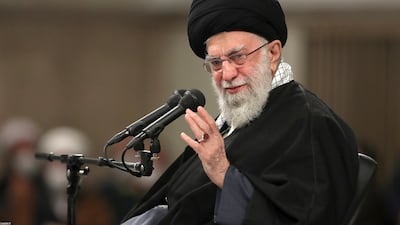Iran's supreme leader has given his seal of approval to the restoration of full diplomatic relations with Egypt, potentially ending decades of tension between the two regional powerhouses.
Grand Ayatollah Ali Khamenei said he would “welcome” the restoration of ties between Egypt during a meeting with the visiting Sultan of Oman, Haitham bin Tariq, whose country is thought to be mediating between Cairo and Tehran.
Sultan Haitham visited Egypt this month and met President Abdel Fattah El Sisi for talks that included the normalisation of relations between Egypt and Iran, according to the officials. His visit to Egypt and Iran were his first since he ascended the throne in the Gulf Arab nation in 2020.
“We welcome this issue and have no problem in this regard,” Mr Khamenei said on the restoration of ties, according to Iranian state television.
Iran’s supreme leader has the final say on major foreign policy decisions, which adds weight to his comment on relations with Egypt.
Oman has long served as an interlocutor in regional conflicts or disputes between Arab and western nations and enjoys close relations with Iran.
The Egyptian officials said Cairo and Tehran were expected to exchange ambassadors before the end of 2023, and that President El Sisi and his Iranian counterpart, Ebrahim Raisi, were to meet later this year.
Mid-level diplomats and intelligence officials from Iran and Egypt held talks behind closed doors in Baghdad in March and April to discuss the normalisation of relations.
More senior officials from the two nations are expected to meet again next month in the Iraqi capital, according to the officials.
Further talks are expected to be held in Oman at a later date.
Relations between Egypt and Iran began to sour in the aftermath of the 1979 Islamic revolution when the late Egyptian leader Anwar Sadat welcomed the deposed Shah Mohammad Reza Pahlavi to Egypt and a year later allowed his burial in Cairo.
There was a relative thaw after the overthrowing of Hosni Mubarak and the subsequent election of Mohammed Morsi, in 2012.
Morsi was removed from power a year later with relations with Tehran cooling after Mr Abdel Fattah el-Sisi took office in 2014.
More recently, relations have been tense over what Cairo sees as Iran’s meddling in the internal affairs of Arab nations such as Iraq, Syria, Lebanon and Yemen.
In a thinly veiled reference to Iran, Mr El Sisi has repeatedly declared Egypt's willingness to come to the aid of its Gulf Arab allies and benefactors if they faced an external threat.
Egyptian officials believe normalised relations with Iran would secure Tehran's goodwill in relation to Cairo's efforts to forge closer economic and commercial ties with countries such as Iraq, Syria and Lebanon, where it wields significant influence.
The nation will also seek to persuade Iran to drop its support for Hamas and Islamic Jihad, the two main militant Palestinian groups in the Gaza Strip, which borders Egypt, according to officials.
Outbursts of hostilities between the two militant groups and Israel present a security threat to Egypt and also impede efforts at reconciliation between the pair and the Palestinian Authority in the occupied West Bank.
Additionally, a thaw in relations between Cairo and Tehran would create a new layer to an continuing regional realignment.

Saudi Arabia has agreed to restore diplomatic relations with Iran after they were severed in 2016. Egypt and Turkey, who have at odds for a decade, have also been working to normalise relations.
In the latest sign of thawing relations between Cairo and Ankara, Mr El Sisi congratulated President Recep Tayyip Erdogan on his re-election.
The eight-year war in Yemen, where Iran has backed the Houthis against the internationally recognised government supported by a Saudi-led military coalition, has significantly quietened amid diplomatic moves to end the conflict.
Syria, where Iran and the Tehran-backed Lebanese group Hezbollah have significant influence, was readmitted to the Arab League this month with Bashar Al Assad, attending this month’s Arab League summit in Jeddah, for the first time in 12 years.
Syria's membership in the Cairo-based grouping was suspended more than a decade ago after its crackdown on anti-government protests.
The readmission of Syria into the Arab fold was warmly welcomed by Iran.


